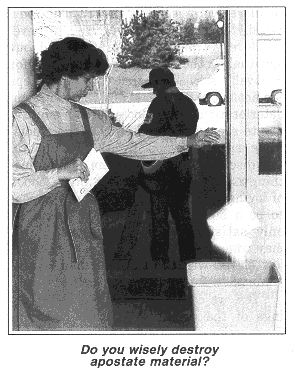Some time ago, I wrote an extensive article on shunning and published it on my website. Since that website had views on doctrinal matters that no longer reflect my current stand, I took the website down. However, my views on this matter are still current, and for the benefit of everyone here, I'm going to post the article here. It's called "SHUNNING - UNCHRISTIAN PSYCHOLOGICAL TORTURE" and it's divided into 10 chapters.
=======================================
PART 1 - OSTRACISM IN THE ANCIENT WORLD
=======================================
On the 5th century BC, the Athenians instituted a form of social rejection called ostracism. Once every year, the people of Athens could elect one person to be expelled from the affairs of the polis. During the assembly at the Agora, the people were asked whether they wished to hold an ostracism, or not. If the answer was “yes”, they would be asked who should be ostracized. The names that gathered enough “support” would be nominated by the presiding officers to become subject to popular vote within two months time.
On this occasion, each voter would be given an ostrakon [a piece of broken pottery; this is where the term ostracize derives from] where each voter would scratch the name of the individual he wished to be ostracized. Then, the presiding officers would sort the votes in separate piles. According to Plutarch and Philocorus, a minimum quorum of 6.000 votes was necessary to validate an ostracism. If the vote was validated, the nominated individual had ten days to leave the city, and it should remain exiled for a period of ten years. Death penalty impended upon those who attempted to return before the ten-year ban. The ostracized individual wouldn’t lose his citizen status, nor his assets were confiscated. This practice appears to have been abandoned by the Athenians after the 4th century BC. Other Greek cities, such as Syracuse, Miletos, Argos and Megara appear to have adopted similar practices.
This was unlike a proper judicial court process, in the sense that there wasn’t an express accusation nor a prosecutor, no inquiry, no witnesses, no trial, no defense; it was understood as a pragmatic way to resolve political and social tensions in a preemptive, rather than punitive fashion, as ten years would normally suffice to deflate whatever issues that had prompted the expulsion. It is theorized that this procedure was instituted as an outlet to allow the populace to vent their public reproach upon individuals they perceived as tyrants, traitors, arrogants, misbehaved or in any other way a threat to public stability, without resorting to mob violence, lynching murder or even civil war.
The underlying aspect of absolute social rejection and exclusion imparted by the original practice of ostracism became the modern synonym of the term. The Merriam-Webster dictionary defines ostracism as “exclusion by general consent from common privileges or social acceptance”. The Collins dictionary defines it as “to exclude or banish (a person) from a particular group, society, etc”.
Eden



















